IT Expatriation: Singapore
After lunch, lounging in an armchair, I read the Internet, when a strange, unfamiliar number suddenly appeared on my phone. “Hmm, weird,” I thought, “Who else did I need so suddenly?” Of course, I decided to pick up the phone, you never know ... "Sasha, hello! This is Cyril, remember? Would you like to work in Singapore? ”- the voice of my old friend, which I hadn’t seen for three years, came through the phone. “Why not?” I replied.
As you understand these lines, I am writing already from Singapore. Below will be my story with moving, rental costs, taxes and living conditions.
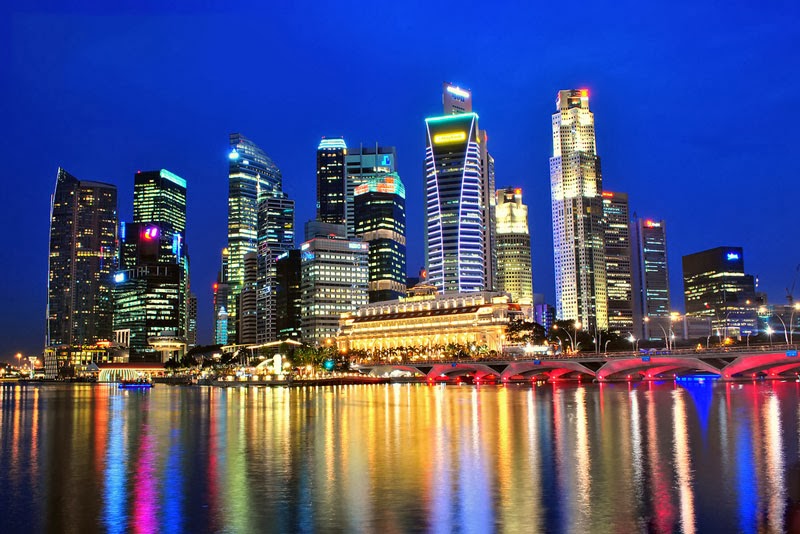
In my case, this question did not arise, due to the fact that a friend invited me. If you decide to search yourself, then all the work will fall on the shoulders of recruitment agencies. The practice adopted in Russia with “respond to a vacancy”, of course, is present, but the chance is significantly reduced. It is also important that only large companies are worth watching, a small startup will not bother with tons of documents for your re-location, so for a start, telecoms and banks are ours.
In fact, there are several types of permissions , but, hopefully, most will not be interested in working as maids, so I will list the most basic ones:
Further, a little about each of the documents:
Work permit for mid-level professionals. There are many of them and programmers also relate to them.
Work permit for highly qualified specialists with a good education.
It is important that only the holder of an EP of the first category can apply for a Personalized Employment Pass.
The most interesting kind of document. The most important advantage is the ability to choose a job yourself. In the case of the first two documents, if you get fired / the contract ends, then you have to leave the city within a couple of weeks, but if you are the owner of PEP, you can remain and be unemployed for six months. But there are a number of nuances upon receipt. Firstly, if you are already working in Singapore, then your annual income should exceed 144,000 SGD (at least 12,000 SGD per month). If you do not work in Singapore, then your monthly salary should be no less than 18,000 SGD (about half a ruble), which is quite a substantial amount. Also, in addition to the wife and children, having this document you can transport your parents.
In general, there is no serious difference between the types of passes, except that the first two make you a direct slave to the employer, and the latter gives you the right to look for work yourself. But it is extremely difficult to obtain.
You can go to Singapore to study languages and get a tourist visa without any problems. What does it give? Firstly, the opportunity to tighten / practice English, look around and, of course, look for work.
If we talk about prices, then a three-month training will cost about 2500 - 3000 SGD, insurance will cost 300 SGD if you use the services of a language school (then you do not need a deposit) or 1500 SGD deposit in the bank (only in DBS ), which will be returned after graduation visa validity. Of course, you will need to rent a house and eat something, but more on that below.

A little lyrical digression to distract from the main topic. From many friends I heard about strong competition from the Indians, discussions on what to do with it and whether to change the profession and so on. So, for the most part, all the maxims on this subject are baseless. You clearly understand this by working in a large, international company. Most Indians are low-skilled IT specialists, and quite specific work has been left to them. For example, there is such a position as change analyst - a “specialist” responsible for project changes. In my case, this is a girl who merges changes from brunch to trunk and vice versa. Almost finished a script that will finally replace it.
I don’t want to say anything bad about the nation. Naturally, there are extremely capable and talented guys, but, as usual, there are such a minority. If you are at least something, then you will not have problems finding a job.
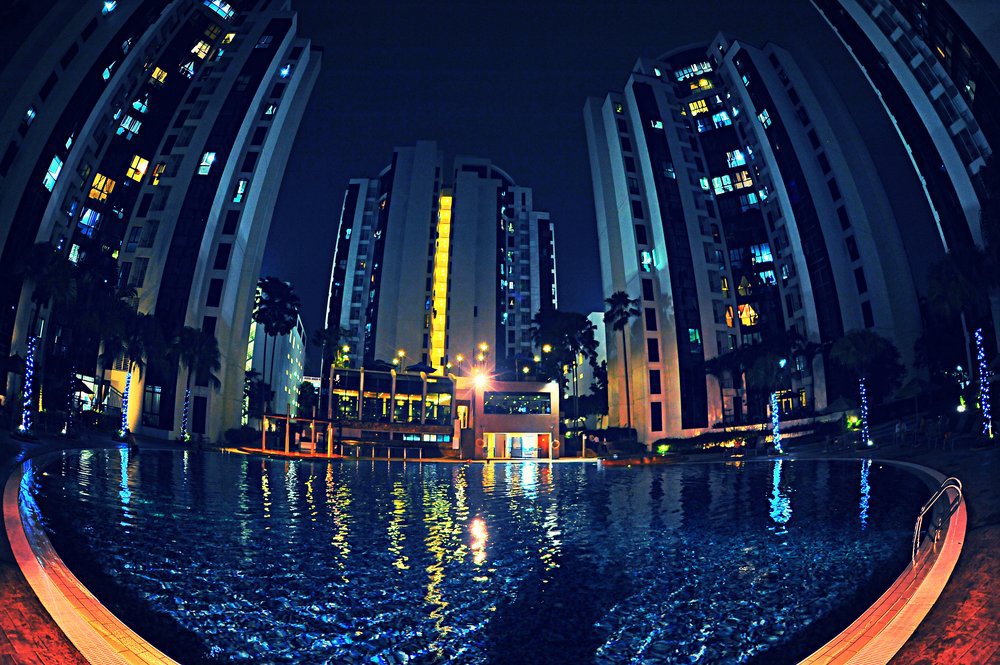
Not so long ago, Singapore was recognized as the most expensive place to live in the world., but is it? For a number of points, the answer is clearly yes. Real estate prices are extremely high. Firstly, it’s quite difficult just to get and find an apartment. As usual, you need to turn to the next parasite of our society - a real estate rental agent. The rental price ranges from 70,000 to 90,000 rubles (2500 - 3000 SGD) not in the city center. In the center, the cost can easily be exceeded for 150,000 - 200,000 (6,000 - 7,000 SGD). And yes, you need to pay for the first and last month, otherwise live on the street. Hmm, do not forget about the collateral for electricity - 15,000 rubles (500 SGD) and for maintaining housing 5,000 rubles (150 SGD). And still you have to pay for all sorts of little things (recurring expenses): electricity and water (100-120 SGD per month), repair of air conditioners (30-40 SGD per Conder, every 3 months), these are your Internet (30 SGD), gas (40 SGD per cylinder) ... The total shallow expenses are 15,000 - 20,000 rubles (500 - 1,000 SGD). Fuf, everything seems to be listed ... Although no, stop! I almost forgot the agentsuddenly you also have to pay - 50% of the rental price in the first month. I was very lucky that a friend agreed that I would stay with him for a couple of months, otherwise it would have been tight before the first salary. In total, the initialization operation cost me about 300,000 rubles (9500 SGD). I don’t presume to give the exact number, as in sensory disorders I stopped conducting detailed calculations.
Of course, there are budget options. Firstly, these are HDB apartments, without pools and gyms. More details about them in the historical box. The second option is to rent a room. Will cost about 25,000 - 35,000 rubles (1,000 - 1,500 SGD).
The most budget option is hostel. I think you can keep within 15,000 - 20,000 rubles.
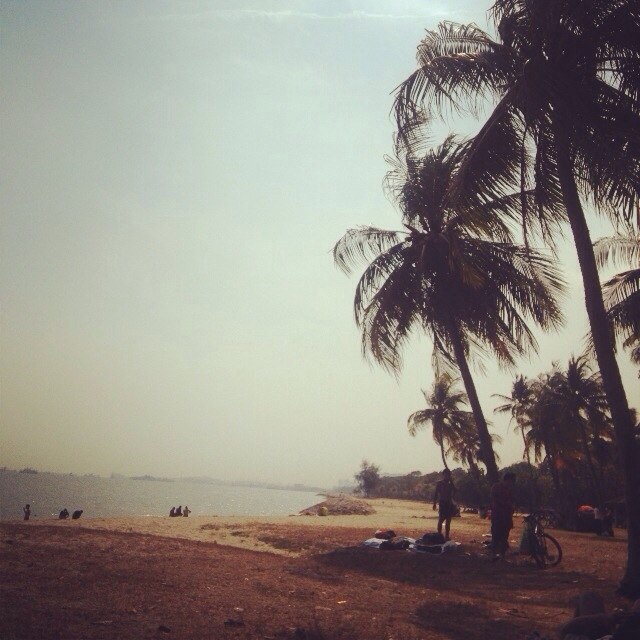
I almost forgot, you can live for free in a tent, in a beautiful park. I hope you understand me correctly.
With the prices of transport and food, everything is good enough. A trip to the restaurant costs from 20 SGD and above, but there is a very democratic option - food courts. A standard portion costs from 3 to 5 SGD (80 - 120 rubles). Very pleased with the variety of juices - from banal orange to exotic, for example, dragon fruit (dragon fruit). Juice costs about 1 to 3 SGD.
Taxes are quite humane, if you have been in the country for less than a year, then the tax will be 15%, otherwise, about 10%.
I had about 100,000 rubles with me, which was easily enough for the first month (about a third remained). But I didn’t have to rent an apartment. I think, given the hostel, this amount would have been enough without problems.
Everything is very well thought out. There are practically no old buildings, the roads are just at the highest level, there are no traffic jams and exhaust gases. A lot of green spaces and shady places, so even on a hot day, walking along the street is quite pleasant.
There are plenty of bike paths and parking lots in the city, but cycling is not always comfortable, especially when the dress code is in the office.
The question of kindergartens and schools did not arise for me, due to the fact that I still do not have children, but, as I understand it, there are no problems. There is a differentiation of schools in specialized subjects (for example, the second language of teaching, the first is necessarily English). Higher education is extremely high quality and affordable for citizens or for residents.
Separately, I want to highlight the concept of a garden city. Singapore is literally immersed in greenery. The plantings are designed in such a way as to minimize your exposure to the sun or to shelter from the doji. You understand the importance of this, having visited, for example, Indonesia, where they do not care about such trifles and where the T-shirt is then soaked in half an hour in the sun.
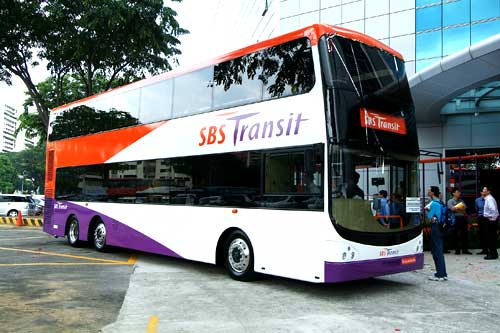
Everything here is also very attractive - travel is not expensive and varies from time to day. For example, from 5 to 7:30 in the subway (fully automated) you can ride for free. At rush hour, the price is higher, thus the fight against congestion is stimulated.
In general, the impression is extremely positive. Of course, there are things that are clearly not enough - companies to drink beer, colleagues of my age (everyone is already over 30) and their native language, but there are a number of advantages that make an extremely positive impression:
High standard of living
According to the latest data, three and a half million the city accounts for two hundred twenty-five thousand millionaires, in other words, approximately every sixteen millionaire. Which entails a high standard of living. Most apartments have a swimming pool and a gym, a good transport system, air conditioning and rain protection systems everywhere.
Zero level tolerance
The principle is very simple - everyone is equal before the law. There are no exceptions. Singapore is a small city, so any excitement, demonstration or scandal can undermine the reputation, which will inevitably lead to an outflow of investors and a loss of confidence.
The fight against corruption in a country where, until a certain point, a bribe was a kind of tradition (as in China) deserves a separate story, I will only quote ex-Prime Minister Lee Kuan Yew:
Tolerance and courtesy
The city is multinational - Indians, Chinese, Malays, Filipinos, Europeans, Australians ... You can list the nations boiling in a local boiler for a long time. Naturally, without tolerance and education, the unity of the nation would not have been achieved. The principle of tolerance and courtesy is imbued with everything around, you can safely go to the post office, not afraid to stumble upon a wall of rudeness and bureaucracy. But there is another side to the coin - we have to put up with a number of unusual circumstances. For example, it is somehow not accepted to restrain sneezing or burping, which, at times, causes a strong resonance.
All close and close
An hour to Malaysia, thirty minutes to Indonesia, two hours to Vietnam, four hours to Nepal. I think these facts are enough. I love traveling and it is extremely important for me to have places for research at my fingertips. For half a year I managed to visit ten countries.
Safety
Do you like to walk around gloomy places with a bundle of money in your hands and a brand new iPhone (which, by the way, will not surprise anyone here. A woman cleaning my apartment has a cooler phone than mine)? Then this is the place for you. Security is extremely high, security cameras hang everywhere, so the likelihood of a crime is minimal. Of course, there are exceptions , but they are extremely rare. Visitors need work that they quickly lose in case of breaking the law, and Singaporeans simply do not need your money.
I hope my experience was useful and the article turned out to be interesting, ready to answer all questions in comments or private messages.
Some interesting resources on the topic:
1. The website of the Ministry of Labor - everything is explained very clearly and intelligibly, respond to online inquiries
2. The history of Singapore from the first hand of the Prime Minister. It is very interesting about the formation of the state, relations with neighbors and the author’s personal view of world problems.
3. The site of the national archive - a bunch of old photographs, films and eyewitness accounts
As you understand these lines, I am writing already from Singapore. Below will be my story with moving, rental costs, taxes and living conditions.

How to look for work?
In my case, this question did not arise, due to the fact that a friend invited me. If you decide to search yourself, then all the work will fall on the shoulders of recruitment agencies. The practice adopted in Russia with “respond to a vacancy”, of course, is present, but the chance is significantly reduced. It is also important that only large companies are worth watching, a small startup will not bother with tons of documents for your re-location, so for a start, telecoms and banks are ours.
List of required documents
- Notarized copies of the diploma with translation
- Notarized and translated tax certificate
- A couple of recommendations from previous jobs and HR contacts
- Passport scans (all pages)
- A bunch of electronic forms
Types of visas (work permits)
In fact, there are several types of permissions , but, hopefully, most will not be interested in working as maids, so I will list the most basic ones:
Further, a little about each of the documents:
S Pass (SP)
Work permit for mid-level professionals. There are many of them and programmers also relate to them.
Employment Pass (EP)
Work permit for highly qualified specialists with a good education.
It is important that only the holder of an EP of the first category can apply for a Personalized Employment Pass.
Personalized Employment Pass (PEP)
The most interesting kind of document. The most important advantage is the ability to choose a job yourself. In the case of the first two documents, if you get fired / the contract ends, then you have to leave the city within a couple of weeks, but if you are the owner of PEP, you can remain and be unemployed for six months. But there are a number of nuances upon receipt. Firstly, if you are already working in Singapore, then your annual income should exceed 144,000 SGD (at least 12,000 SGD per month). If you do not work in Singapore, then your monthly salary should be no less than 18,000 SGD (about half a ruble), which is quite a substantial amount. Also, in addition to the wife and children, having this document you can transport your parents.
In general, there is no serious difference between the types of passes, except that the first two make you a direct slave to the employer, and the latter gives you the right to look for work yourself. But it is extremely difficult to obtain.
Great workaround!
You can go to Singapore to study languages and get a tourist visa without any problems. What does it give? Firstly, the opportunity to tighten / practice English, look around and, of course, look for work.
If we talk about prices, then a three-month training will cost about 2500 - 3000 SGD, insurance will cost 300 SGD if you use the services of a language school (then you do not need a deposit) or 1500 SGD deposit in the bank (only in DBS ), which will be returned after graduation visa validity. Of course, you will need to rent a house and eat something, but more on that below.
Historical background: education
Сейчас сингапурсие университеты устойчиво держаться в топах мировых рейтингов, но, естественно, так было не всегда. Первой проблемой был язык. Преподавание велось на китайском, да еще и не на самом распространенном его диалекте. Второй — общая осталось системы образования и промышленности. Важность образования в истории Сингапура сложно переоценить. Городу нужно было привлекать инвестиции, что сложно сделать не имея квалифицированных местных рабочих.
Первая проблема была решена легко и непринужденно — образование во всех высших учебных заведениях было переведено на английский язык. В школах родной язык шел вторым. Естественно, данная программа вызвала недовольства у местного этнического большинства — китайцев. В частности, независимыми инвесторами (владельцами корпорации по производству тигрового бальзама, имя которого носит один из самых убогих парков в городе) был профинансированрассововерный китайский университет — Наньян Политехникал. Затея завершилась полным крахом, образование скатилось в сраное говно обесценилось в силу того, что студентам без знания английского трудно было найти работу и общаться со специалистами в своей среде. Профессора потеряли энтузиазм, а студенты знания. Правительство вмешалось в ситуацию, переаттестовало профессоров и перевело процесс обучения на английский.
В 2013 году Национальный университет Сингапура занял двадцать четвертую строчку в мировом рейтинге.
Первая проблема была решена легко и непринужденно — образование во всех высших учебных заведениях было переведено на английский язык. В школах родной язык шел вторым. Естественно, данная программа вызвала недовольства у местного этнического большинства — китайцев. В частности, независимыми инвесторами (владельцами корпорации по производству тигрового бальзама, имя которого носит один из самых убогих парков в городе) был профинансирован
В 2013 году Национальный университет Сингапура занял двадцать четвертую строчку в мировом рейтинге.
Should Indians Be Afraid?

A little lyrical digression to distract from the main topic. From many friends I heard about strong competition from the Indians, discussions on what to do with it and whether to change the profession and so on. So, for the most part, all the maxims on this subject are baseless. You clearly understand this by working in a large, international company. Most Indians are low-skilled IT specialists, and quite specific work has been left to them. For example, there is such a position as change analyst - a “specialist” responsible for project changes. In my case, this is a girl who merges changes from brunch to trunk and vice versa. Almost finished a script that will finally replace it.
I don’t want to say anything bad about the nation. Naturally, there are extremely capable and talented guys, but, as usual, there are such a minority. If you are at least something, then you will not have problems finding a job.
What about prices and taxes?

Not so long ago, Singapore was recognized as the most expensive place to live in the world., but is it? For a number of points, the answer is clearly yes. Real estate prices are extremely high. Firstly, it’s quite difficult just to get and find an apartment. As usual, you need to turn to the next parasite of our society - a real estate rental agent. The rental price ranges from 70,000 to 90,000 rubles (2500 - 3000 SGD) not in the city center. In the center, the cost can easily be exceeded for 150,000 - 200,000 (6,000 - 7,000 SGD). And yes, you need to pay for the first and last month, otherwise live on the street. Hmm, do not forget about the collateral for electricity - 15,000 rubles (500 SGD) and for maintaining housing 5,000 rubles (150 SGD). And still you have to pay for all sorts of little things (recurring expenses): electricity and water (100-120 SGD per month), repair of air conditioners (30-40 SGD per Conder, every 3 months), these are your Internet (30 SGD), gas (40 SGD per cylinder) ... The total shallow expenses are 15,000 - 20,000 rubles (500 - 1,000 SGD). Fuf, everything seems to be listed ... Although no, stop! I almost forgot the agent
Of course, there are budget options. Firstly, these are HDB apartments, without pools and gyms. More details about them in the historical box. The second option is to rent a room. Will cost about 25,000 - 35,000 rubles (1,000 - 1,500 SGD).
The most budget option is hostel. I think you can keep within 15,000 - 20,000 rubles.

I almost forgot, you can live for free in a tent, in a beautiful park. I hope you understand me correctly.
With the prices of transport and food, everything is good enough. A trip to the restaurant costs from 20 SGD and above, but there is a very democratic option - food courts. A standard portion costs from 3 to 5 SGD (80 - 120 rubles). Very pleased with the variety of juices - from banal orange to exotic, for example, dragon fruit (dragon fruit). Juice costs about 1 to 3 SGD.
Taxes are quite humane, if you have been in the country for less than a year, then the tax will be 15%, otherwise, about 10%.
Historical background: HDB apartments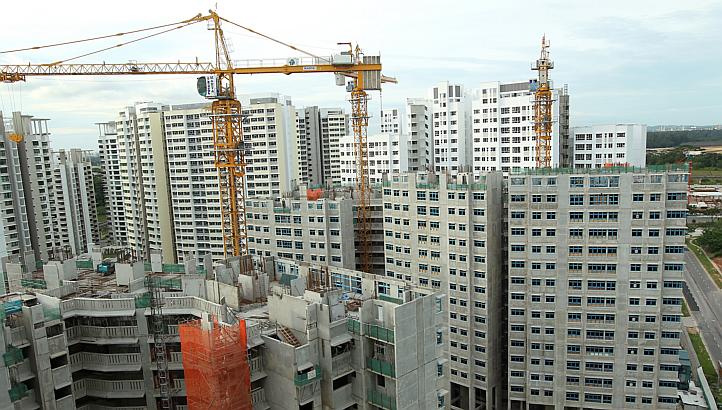
На момент обретения независимости большая часть населения проживала в убогих самодельных лачугах, разбросанных по всему острову. Одна из целей Ли Кван Ю была возможность каждому жителю города предоставить отдельное жилье. Идея была проста — граждане будут относится к своему собственному жилью значительно лучше, чем к арендованному, что, в перспективе, позволит поднять благосостояние населения.
Решение было найдено — город стал строить бюджетные квартиры, которые должны были выкупаться гражданами в долгосрочный кредит под мизерный процент (фактически, ипотека под 2%, она существует и сейчас).
Такая политика привела к тому, что 95% населения имеют личное жилье и цены на сдаваемое взлетают просто до небес.

На момент обретения независимости большая часть населения проживала в убогих самодельных лачугах, разбросанных по всему острову. Одна из целей Ли Кван Ю была возможность каждому жителю города предоставить отдельное жилье. Идея была проста — граждане будут относится к своему собственному жилью значительно лучше, чем к арендованному, что, в перспективе, позволит поднять благосостояние населения.
Решение было найдено — город стал строить бюджетные квартиры, которые должны были выкупаться гражданами в долгосрочный кредит под мизерный процент (фактически, ипотека под 2%, она существует и сейчас).
Такая политика привела к тому, что 95% населения имеют личное жилье и цены на сдаваемое взлетают просто до небес.
So how much to take, in the end?
I had about 100,000 rubles with me, which was easily enough for the first month (about a third remained). But I didn’t have to rent an apartment. I think, given the hostel, this amount would have been enough without problems.
Infrastructure
Everything is very well thought out. There are practically no old buildings, the roads are just at the highest level, there are no traffic jams and exhaust gases. A lot of green spaces and shady places, so even on a hot day, walking along the street is quite pleasant.
There are plenty of bike paths and parking lots in the city, but cycling is not always comfortable, especially when the dress code is in the office.
The question of kindergartens and schools did not arise for me, due to the fact that I still do not have children, but, as I understand it, there are no problems. There is a differentiation of schools in specialized subjects (for example, the second language of teaching, the first is necessarily English). Higher education is extremely high quality and affordable for citizens or for residents.
Separately, I want to highlight the concept of a garden city. Singapore is literally immersed in greenery. The plantings are designed in such a way as to minimize your exposure to the sun or to shelter from the doji. You understand the importance of this, having visited, for example, Indonesia, where they do not care about such trifles and where the T-shirt is then soaked in half an hour in the sun.
Public transport

Everything here is also very attractive - travel is not expensive and varies from time to day. For example, from 5 to 7:30 in the subway (fully automated) you can ride for free. At rush hour, the price is higher, thus the fight against congestion is stimulated.
Historical background: highways
Серьезной проблемой любого современного города являются организация транспортных потоков. Если сто лет назад была сложность в сборе навоза, то сейчас это пробки и выхлопные газы (Москва — это еще пол беды, а вот как живут в Пекине я не понимаю).
С аналогичной проблемой столкнулся и Сингапур. Решили ее достаточно быстро.
Во-первых, жестко был ограничен весь индивидуальны транспорт. Серьезные налоги на ввоз машин и аукцион прав на владение машиной существенно поумерил пылюных «менеджеров» с первой зарплаты граждан к покупке личного транспорта. Сейчас цена лицензии на 10 лет достигает 100.000 SGD (около 3.000.000 рублей). Количество лицензий ограничено и рассчитывается каждый год в зависимости от пропускной способности дорожной сети.
Во-вторых, общественный транспорт дешев и удобен. Разветвленная сеть автоматического метро (без машиниста), комфортные автобусы, хорошие дороги… Все это за максимум в 100 SGD (3000 руб) в месяц. Кстати, акционерами транспортной системы являются обычные рабочие, но это отдельная тема для разговора.
В-третьих, дешевое и качественное такси. За 25-30 SGD (700 — 1000 рублей) можно спокойно проехать из одного конца города в другой. Если хочетсяпафоса комфорта можно поехать на крайслере или белом месредесе. В Санкт-Петербурге аналогичная услуга стоила 1500 рублей для местных и 3500 для иностранцев, что печально.
С аналогичной проблемой столкнулся и Сингапур. Решили ее достаточно быстро.
Во-первых, жестко был ограничен весь индивидуальны транспорт. Серьезные налоги на ввоз машин и аукцион прав на владение машиной существенно поумерил пыл
Во-вторых, общественный транспорт дешев и удобен. Разветвленная сеть автоматического метро (без машиниста), комфортные автобусы, хорошие дороги… Все это за максимум в 100 SGD (3000 руб) в месяц. Кстати, акционерами транспортной системы являются обычные рабочие, но это отдельная тема для разговора.
В-третьих, дешевое и качественное такси. За 25-30 SGD (700 — 1000 рублей) можно спокойно проехать из одного конца города в другой. Если хочется
And how are you feeling?
In general, the impression is extremely positive. Of course, there are things that are clearly not enough - companies to drink beer, colleagues of my age (everyone is already over 30) and their native language, but there are a number of advantages that make an extremely positive impression:
High standard of living
According to the latest data, three and a half million the city accounts for two hundred twenty-five thousand millionaires, in other words, approximately every sixteen millionaire. Which entails a high standard of living. Most apartments have a swimming pool and a gym, a good transport system, air conditioning and rain protection systems everywhere.
Zero level tolerance
The principle is very simple - everyone is equal before the law. There are no exceptions. Singapore is a small city, so any excitement, demonstration or scandal can undermine the reputation, which will inevitably lead to an outflow of investors and a loss of confidence.
The fight against corruption in a country where, until a certain point, a bribe was a kind of tradition (as in China) deserves a separate story, I will only quote ex-Prime Minister Lee Kuan Yew:
Start by planting your three friends. You know exactly what, and they know why.
Historical background: the fight against corruption
Проблема была крайне актуальной. Естественно, взяточничество и коррупция не делают страну привлекательной для инвесторов, а вопрос привлечения оных проходил красной линией на первых этапах становления города государства. Лекарство от взяточнечества, как обычно бывает, оказалось простым, эффективным и очень жестоким — смертная казнь и суровое уголовное наказание (кстати, наказания тростникавыми палками до сих пор в силе). Важный момент, что законы можно принимать любые, но важно заставить их работать. Для решения этой проблемы были приглашены первоклассные судьи с адекватными по мировым стандартам зарплатами. Полиция, также была переформирована. Только после этого мощная судебная машина начала набирать свой ход.
Спустя несколько суровый лет знаменитый Zero Level Tolerance стал одни из столпов этой страны. Сейчас Сингапур занимает пятое место в индексе восприятия коррупции (Россия — 159).
Спустя несколько суровый лет знаменитый Zero Level Tolerance стал одни из столпов этой страны. Сейчас Сингапур занимает пятое место в индексе восприятия коррупции (Россия — 159).
Tolerance and courtesy
The city is multinational - Indians, Chinese, Malays, Filipinos, Europeans, Australians ... You can list the nations boiling in a local boiler for a long time. Naturally, without tolerance and education, the unity of the nation would not have been achieved. The principle of tolerance and courtesy is imbued with everything around, you can safely go to the post office, not afraid to stumble upon a wall of rudeness and bureaucracy. But there is another side to the coin - we have to put up with a number of unusual circumstances. For example, it is somehow not accepted to restrain sneezing or burping, which, at times, causes a strong resonance.
All close and close
An hour to Malaysia, thirty minutes to Indonesia, two hours to Vietnam, four hours to Nepal. I think these facts are enough. I love traveling and it is extremely important for me to have places for research at my fingertips. For half a year I managed to visit ten countries.
Safety
Do you like to walk around gloomy places with a bundle of money in your hands and a brand new iPhone (which, by the way, will not surprise anyone here. A woman cleaning my apartment has a cooler phone than mine)? Then this is the place for you. Security is extremely high, security cameras hang everywhere, so the likelihood of a crime is minimal. Of course, there are exceptions , but they are extremely rare. Visitors need work that they quickly lose in case of breaking the law, and Singaporeans simply do not need your money.
I hope my experience was useful and the article turned out to be interesting, ready to answer all questions in comments or private messages.
Some interesting resources on the topic:
1. The website of the Ministry of Labor - everything is explained very clearly and intelligibly, respond to online inquiries
2. The history of Singapore from the first hand of the Prime Minister. It is very interesting about the formation of the state, relations with neighbors and the author’s personal view of world problems.
3. The site of the national archive - a bunch of old photographs, films and eyewitness accounts
